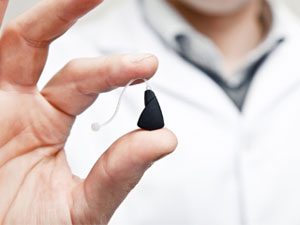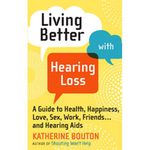Only 14 Percent of People With Hearing Loss Use Hearing Aids. This Is a Major Health Crisis.
Updated: Apr. 21, 2016
Ignoring hearing loss can raise the risk of dementia, falls, and other serious health concerns. Here, a writer with hearing loss weighs in on the need to eliminate a stigma around hearing aids so people can get the help they need.
 The facts are staggering: 48 million Americans have hearing loss and 90 percent could benefit from hearing aids. But only 14 percent have them—and many don’t use them with any consistency.
The facts are staggering: 48 million Americans have hearing loss and 90 percent could benefit from hearing aids. But only 14 percent have them—and many don’t use them with any consistency.
The average age of first–time hearing aid users is approximately 70, even though half of them began to lose their hearing at least a decade earlier. This is a lot of people with less than optimal hearing.
Some people with hearing loss think they hear—and understand—perfectly well. Others assume that the loss is part of aging. Some people with hearing loss simply can’t afford hearing aids. Some worry that hearing aids will make them seem old. While these people are concerned about money and appearances, their hearing loss is not only getting worse, it’s also becoming a hazard to other aspects of their life and health.
The Dangers of Untreated Hearing Loss
Untreated hearing loss has physical and psychological consequences that far outweigh the inability to hear well. Hearing loss has been linked to depression and social isolation, to paranoia, and to personality changes like becoming more introverted.
Hearing loss has also been linked to a greater risk of falling. Data from the National Health and Nutrition Examination Survey show a three-fold increase in the risk of falls among people with a very mild hearing loss. The chances of falling increased with increasing hearing loss.
Then there’s dementia. Clinical research has shown that hearing loss is found in nine out of ten subjects with dementia. This could be because those with hearing loss are more likely to isolate themselves, which is itself a risk factor for faster cognitive decline. It could also be that the changes in brain structure that we know accompany hearing loss also affect cognition.
All those people who can’t hear in restaurants or other noisy places, whose wives mumble, who can’t hear on the telephone—all those people who say they don’t need hearing aids—are putting themselves at greater risk for cognitive decline.
Hearing health professionals have long argued that the optimum time for fitting hearing aids is when the older adult is still young enough to be motivated to use them, as well as physically and cognitively able to adjust to the technology. Given the average age of 70 of first-time hearing aid users, one in five will likely have a significant cognitive loss by the time they’re trying to learn to adapt to hearing aids, notes M. Kathleen Pichora-Fuller, a psychologist at the University of Toronto.
Untreated hearing loss also results in soaring public-health expenditures. In the United States our shortsighted view in not underwriting the cost of hearing aids results in billions of dollars spent down the line. (The World Health Organization projects that the worldwide incidence of dementia will nearly double from 35.6 million in 2010 to 65.7 million in 2030. Treating dementia today costs $600 billion a year. The 2050 cost is estimated at $1.2 trillion).
In the workplace, untreated hearing loss contributes to underperformance. More than half of people with hearing loss are under age 60—prime working years—and they are the least likely age group to get hearing aids. Early retirement, disability retirement, a less productive workforce are all costly.
Dispelling the Stigma of Hearing Loss
The more people who are outspoken about hearing loss and our need for affordable, effective, and accessible hearing help, the more the market will meet that demand. Hearing aid companies are already getting the message, and feeling the competition from the manufacturers of other hearing devices. So are audiologists. Big-box stores like Costco offer full audiological services and hearing aids at half the price, or even less, elsewhere.
Hearing loss should be accommodated as routinely as other disabilities. It’s no different from being nearsighted or having high cholesterol. We wouldn’t think of ignoring those, and if we did it could be at our peril. Continue with the high-fat diet, don’t exercise, and refuse to take a statin, and you may end up with a heart attack. Fail to use sunscreen and you may end up with melanoma. Continue to ignore your hearing loss and put yourself at risk for falls and dementia.
If we talk about how severely hearing loss can limit lives and compromise healthy aging, institutions will change. They’re already beginning to. Think about movie theaters. We wouldn’t consider denying someone in a wheelchair access to a movie theater. But until very recently, people with hearing loss couldn’t enjoy a movie. Now, as a result of advocacy and lawsuits by consumer-advocacy organizations like the Hearing Loss Association of America (HLAA) and AARP, captioning devices for the hard of hearing are the law. The New York City subway system, famous for its garbled announcements, now has information scrolling across screens in the stations and on the trains.
But we still have a long way to go. It’s amazing to me that 911 emergency systems still work only with voice calls, not text. The technology exists to text 911–all of the major cell phone providers offer it. But 92 percent of first responders around the country can’t receive a 911 text. Too bad for someone like me if I happen to witness an accident or a crime and need to alert an emergency responder. I can talk, of course, but I can’t answer questions, and I worry the busy operator would hang up on me.
Hearing loss itself is not an obstacle to communication. The failure in communication—in hearing—is a result instead of our personal and societal willful ignorance about hearing loss, our reluctance to acknowledge it and to treat it. The hearing aid profession’s obfuscation about pricing has to change, and the costs have to come down. Failure to acknowledge cheaper and simpler aids to hearing disserves the needy public.
Healthy hearing means healthier aging. Healthier aging is happier living.
 For more information about how to navigate hearing loss (from mild to severe), check out Living Better With Hearing Loss: A Practical Guide to Health, Happiness, Love, Sex, Work, Friends … And Hearing Aids
For more information about how to navigate hearing loss (from mild to severe), check out Living Better With Hearing Loss: A Practical Guide to Health, Happiness, Love, Sex, Work, Friends … And Hearing Aids